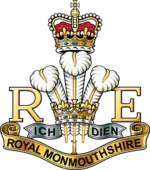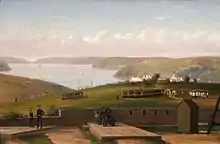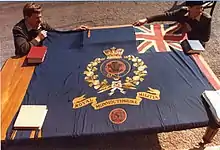Royal Monmouthshire Royal Engineers
The Royal Monmouthshire Royal Engineers (Militia) is the most senior regiment of the British Army Reserve.[2] The regiment was formed in 1539 during the reign of by King Henry VIII, making it the second oldest regiment of the British Army (The Honourable Artillery Company was formed in 1537). The R Mon RE (M) became a militia unit in 1660 and then became a part of the Royal Engineers in 1877.[3]
| Royal Monmouthshire Royal Engineers (Militia) | |
|---|---|
 Insignia of the RMRE | |
| Active | 1539–present |
| Country | |
| Branch | |
| Type | Field Engineers |
| Size | Regiment 515 personnel[1] |
| Part of | 25 (Close Support) Engineer Group |
| Regimental HQ | Monmouth Castle, Monmouth |
| March | Ap Jenkyn (Regimental Quick March) |
| Engagements | |
| Commanders | |
| Royal Honorary Colonel | The Duke of Gloucester |
| Insignia | |
| Arm Badge | Militia Flash |
History

The two 'Royals'
The regiment was formed as a posse comitatus in 1539 during the reign of by King Henry VIII; it went on to become a trained band and then a militia unit in 1660.[4] It is unique in having the word 'Royal' appear twice in its name. It gained the first Royal in 1804 when it was the Monmouth and Brecon Militia. The second was acquired in 1877 when the regiment transferred from an infantry unit into a Special Reserve section of the expanding Royal Engineers.[5]
On 1 April 1967, the existing regiment absorbed 43rd Wessex Division RE (TA), 48th South Midland Division RE (TA) and 53rd Welsh Division RE (TA).[6]
Seniority dispute with the Honourable Artillery Company
The records of the Honorable Artillery Company (HAC) indicate that it was formed two years prior to the Royal Monmouthshire Royal Engineers (Militia). However, in 1930 the Army Council (Army Board from 1964) reviewed the Army's precedence table and King George V agreed that, on account of its status as a militia unit, the Royal Monmouthshire Royal Engineers (Militia) were the senior regiment.[2] In 1957 the matter was investigated further and Queen Elizabeth II also agreed that the Royal Monmouthshire Royal Engineers (Militia) were the senior regiment:[2]
From:-Lieut.-Colonel The Rt. Hon. Sir Michael Adeane, K.C.B., K.C.V.O . Private Secretary to the Queen, Buckingham Palace, S.W.1. 12th March, 1957.
My dear Playfair, Thank you for your letter of 8th March which I have laid before The Queen and which Her Majesty has read with interest. I am to say that the recommendation of the Honours and Distinctions Committee with regard to the relative precedence of the Royal Monmouthshire Royal Engineers and the Honourable ArtiIlery Company meets with the Queen's approval.
Yours sincerely,
The Royal Jersey Militia
The Jersey Militia were brought under the command of the R Mon RE (M) in 2007. The Jersey Militia was formed in 1337 when Edward III ordered "all his faithful peoples of the islands" to be prepared - by forming a militia - for possible war with France.[7] The militia defended the island against several pirate raids, and in 1549 against a French invasion attempt.[8] The militia played a role in the Battle of Jersey, for which its actions gained it the 'Royal' title.[9]
Militia and Militiamen
Militia historically were regarded as light infantry regiments.[10] In recognition of its Light Infantry ancestry the regiment was afforded the right to wear the militia flash in 1943.[11] A small, light infantry green rectangle, often referred to as the snooker table; worn at the top of the left arm. Soldiers of the regiment are Sappers but also militiamen and wear the militia flash in perpetuity, as observed by Brigadier John Henry Ridge CBE when inspecting troops in 2017.[12]
Current organisation
The current organisation of the regiment is as follows:[13]
- Regimental Headquarters and Headquarters Troop, at Monmouth Castle[14]
- 100 (Militia) Field Squadron, at Chapman House, Cwmbran[15]
- 108 (Welsh) Field Squadron (Militia), at John Chard VC House, Swansea[17]
- 225 (City of Birmingham) Field Squadron (Militia), at Gundolph House, Oldbury[18]
- 1 Troop, at Baskeyfield House, Stoke-on-Trent[19]
- 2 Troop, in Cannock[20]
- Jersey Field Squadron (Royal Militia of the Island of Jersey), in Saint Helier, Jersey
- Guernsey Troop, at Saint Peter Port, Guernsey
Regimental museum

The regimental museum of the Royal Monmouthshire Royal Engineers is in Monmouth Castle.[21]
Notable Officers
- Jules Hudson, television producer and presenter, best known for presenting the BBC series Escape to the Country.[22]
- Brigadier John Henry Ridge CBE a troop commander within the regiment during the early 1990's prior to receiving a regular army commission[23]
Notable Soldiers
- Jon Latimer, military historian, author, and part-time lecturer at Swansea University.[24]
References
- "Army – Question for Ministry of Defence". p. 1. Retrieved 14 December 2020.
- "Seniority". www.monmouthcastlemuseum.org.uk. Retrieved 8 November 2021.
- "Home". www.monmouthcastlemuseum-archives.org.uk. Retrieved 8 November 2021.
- "Origins". www.monmouthcastlemuseum.org.uk. Retrieved 8 November 2021.
- "The Regimental Archive of the Royal Monmouthshire Royal Engineers (Militia)". Monmouth Castle. Retrieved 31 December 2011.
- "Corps of Royal Engineers, Volunteer Regiments". Archived from the original on 22 September 2007. Retrieved 31 August 2012.
- "Royal Jersey Militia: Castle and Regimental Museum - Monmouth". www.monmouthcastlemuseum.org.uk. Retrieved 8 November 2021.
- "Jardin D'Olivet (1549 Battlefield site)". History Alive. Retrieved 8 November 2021.
- "Royal Jersey Militia: Castle and Regimental Museum - Monmouth". www.monmouthcastlemuseum.org.uk. Retrieved 8 November 2021.
- "Home". www.monmouthcastlemuseum-archives.org.uk.
- "The Seniority Parade". Castle and Regimental Museum.
- "Tunbridge Wells soldier praises troops in Caribbean relief effort". Tunbridge Wells Local News | Times Local Newspapers & Magazines. 20 September 2017.
- "About us". R Mon RE (M). Retrieved 13 May 2021.
- "The Castle, Monmouth NP25 3BS". Army Careers. Retrieved 17 April 2021.
- "Chapman House, Ty Coch Way, Swmbran NP44 7HB". Army Careers. Retrieved 17 April 2021.
- "The Artillery Grounds, Whiteladies Road, Bristol BS8 2LG". Army Careers. Retrieved 17 April 2021.
- "John Chard VC House, Glamorgan Street, Swansea SA1 3SY". Army Careers. Retrieved 17 April 2021.
- "Gundolph House, Wolverhampton Road, Oldbury B68 8DH". Army Careers. Retrieved 17 April 2021.
- "Baskeyfield House, Anchor Road, Stoke on Trent ST3 5BL". Army Careers. Retrieved 17 April 2021.
- "156 Walsall Road, Bridgetown, Cannock WS11 0JB". Army Careers. Retrieved 17 April 2021.
- "The Castle and Regimental Museum". Monmouth Castle Museum. Retrieved 31 December 2011.
- "Lead, Follow, Or Get Out The Way - Military Mantra That TV's Jules Hudson Lives By". Forces Network. 22 January 2020. Retrieved 8 November 2021.
- "Dining Club Newsletter: More Members' News" (PDF). Royal Monmouthshire Royal Engineers. 1 September 2015. Retrieved 12 October 2023.
- "Jon Latimer". The Times. 16 January 2009. Archived from the original on 23 May 2010.
External links
- Regimental/Museum/Trust & Dining Club site
- Official site
- Regimental Museum
- Royal Engineers Museum - Militia, Volunteers and Territorials (1757–1979)
